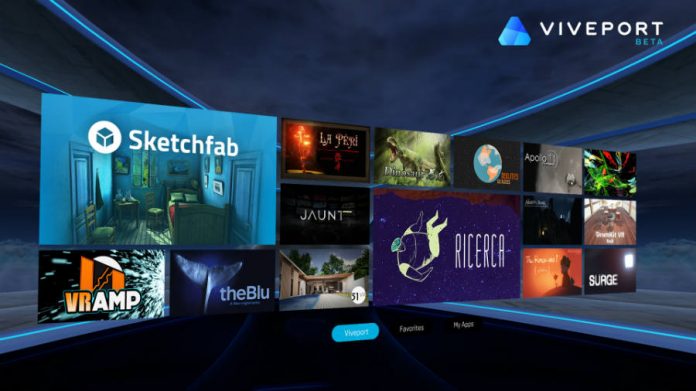
HTC is launching its VR store, Viveport, an alternative to the known Steam catalog. It will soon launch globally as a beta version, followed by a full rollout. Developers can register on the official site to get involved with the project. HTC will take a 70/30 revenue split with them.
The new store will focus on general-interest, an alternative for the game-focused Steam platform. It will be available for web browsers and Vive headsets, and an app will exist for PC and mobile devices. The VR-catalog will also have space in the Vive Home virtual environment.
Customers will have to visit separate storefronts for different types of content, so the interface is not very friendly or practical. A small price to pay for variety.
Viveport offers Virtual Reality experiences
Viveport was announced early 2016, and it recently launched in China, where Valve’s gaming store is not the leader platform. Now, the global beta version will launch in the next weeks to become the place-to-go to find “crazy-cool, immersive experiences.”
Steam already has a “general-interest”-like the catalog, featuring general software, such as animation, design and game-developing programs, or even films in the form of a virtual theater.
Furthermore, the store offers an overwhelming amount of titles, both VR and non-VR. With such a leading presence in the market, HTC states they “don’t necessarily want to compete with it,” only add more categories.”
“Viveport will play an important role in giving access to virtual reality experiences that will enhance our daily lives and the way we connect with friends and family. The Vive team and our customers cannot wait to see what new experiences will be shared by our partners in the developer community,” said Steiber.
HTC has a decent trajectory and enough tools to gain a lot of popularity despite the presence of Steam. Viveport advertises itself as a dedicated store for edutainment, social media, news, sports, health, travel, shopping and 360˚ video.
Comparing Vive to Steam doesn’t seem fair because HTC is not focusing on the gaming industry, that would be pointless. In other words, even though they look the same, HTC wants to appeal a different audience, but it doesn’t mean the store is not going to offer games.
.@rikardsteiber on the @vrlosangeles main stage now talking about Viveport #VRLA #Viveport pic.twitter.com/LDlJslYbaF
— HTC VIVE (@htcvive) August 6, 2016
HTC is trying to distinguish itself from the rest in the VR market
Vive becomes a crucial part of HTC’s future, a company that made a massive push into the VR market with its top-end gear, the most expensive in the market.
Even with their increasing popularity in the VR world, where they compete with Facebook’s Oculus Rift, the company has been struggling to keep the money flowing. The Taiwanese enterprise saw a drop around 44 percent in the second quarter of 2016, after a first three months period where their revenue fell another 61 percent.
Viveport represents a significant step for the company towards a branch they have already made a dent. Building a non-gaming store shelve might be the smart move to land some distinction for the Vive brand in a field that will soon be crowded with the incursion of the PlayStation VR next October.
Source: HTC Blog










